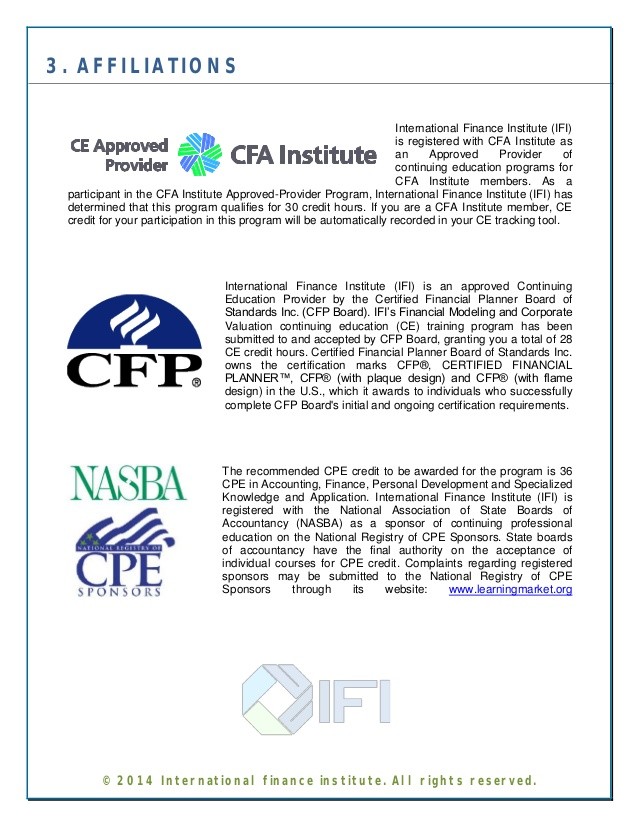The CFA and Investment Banking
Post on: 16 Март, 2015 No Comment

A long time ago I listed the CFA in a list of stuff investment bankers dont like , which resulted in a lot of controversy and dozens of angry comments.
Being a marketer, I actually liked all the attention.
But ever since then, there have been discussions on message boards and via email of my claim that the CFA is useless for investment banking.
So I wanted to explain in more detail why I dont like it and why you can waste hundreds of hours studying for the CFA but also why it can be useful in some situations.
Why All the Hate?
If youve been in school most of your life, youve been conditioned into thinking that grades / degrees / certifications = success .
So by extension, you might think that the CFA = success.
Just one small problem: the real world doesnt work like that.
Everything is based on money. rather than grades or paper designations.
If you want to make a serious amount of money, you need to generate a serious amount of money and take a percentage of it via investments, sales, clients, and so on.
And the CFA doesnt prepare you to sell products or to win clients, or even to make investments (yes, it tests your analytical skills but not your make-a-tough-decision skills).
The Time Requirements
To put that number in perspective:
- A full-time job is 2,000 hours per year (50 weeks * 40 hours per week).
- You could conduct informational interviews with 900 bankers in that same time, assuming 30 minutes for research and setup and 30 minutes for the interview.
- You could do an entire investment banking internship in less than that amount of time (10 weeks * 80 hours per week).
- You could learn another language and study abroad for 3 months in the same amount of time (12 weeks * 40 hours per week + 300-400 hours to achieve a basic proficiency).
And those last 3 items would help you break into investment banking far more than passing the CFA.
Remember that time is the scarcest resource of all you can never generate more time no matter how much money you have.
Even if youre in school and you think you have infinite time, those 900 hours take away from socializing, studying, and activities.
The CFA in Investment Banking, Sales & Trading, Private Equity, Hedge Funds, and More
Very few professionals in these fields have the CFA designation, even at the top levels.
The CFA does not cover the accounting, valuation, and financial modeling specific to investment banks. and theres nothing on conducting due diligence, creating pitch books. or communicating with senior bankers all of which youll be doing a lot as an analyst or associate.
Heres how it stacks up across different industries:
- Investment Banking: Hardly any overlap, and its uncommon to see the certification at all.
- Private Equity: See above.
- Sales & Trading: See above.
- Corporate Development: Even less overlap, especially if you do partnership deals rather than M&A.
- Hedge Funds: There can be more overlap here depending on the type of fund, and some managers like to see the certification but its still not as helpful as going to a top school or getting solid work experience.
- Equity Research: As with hedge funds it can be more useful here, but at the entry-level its not worth the time investment.
The CFA is best for portfolio management. which most of us are not interested in.

Theres nothing wrong with wanting to do portfolio management rather than the industries above, but you need to be aware of where the CFA will help and where it wont.
Why You Might Want to Ignore All This and Get Certified Anyway
I like to present both sides of the story, so heres the case for the CFA:
You Have the Free Time
Maybe youve already networked like a ninja. or you have no interest in setting up 900 informational interviews (I admit it, that it is excessive).
Or maybe youre working full-time, networking on the side, and you can still devote 10-20 hours per week to the CFA.
If youre in one of these categories, then it may not be such a bad idea to do the CFA.
Remember, its not that its completely useless having the bullet point will show that you know something about finance its that it doesnt deliver a solid return on time .
But if you have a surplus of free time, thats less of an issue.
In some cities, there are CFA Societies that you can join once you get the certification and they can be very helpful for networking .
There wont be too many bankers in these societies because the CFA is more common in portfolio management but you can get referrals from other CFA charter holders and use those to meet bankers.
These groups are more hit-and-miss than alumni networking, professors, student groups, and other tried-and-true methods. but you should consider them if you spend the 900 hours to get the certification in the first place.
Youre in an Emerging Market
The CFA wont turn the heads of many bankers in the US and Europe, but it gets more respect in emerging markets like India. parts of Asia, and South Africa .
Especially if youre in a region thats more traditional when it comes to recruiting AKA networking does not work as well the CFA may give you a leg up.
Do not drop out of school or quit working to take the exam consider it if you have extra time, youve networked extensively without much success, or youre coming from a non-traditional background where the CFA demonstrates your interest in finance.
Youre Interested in Portfolio Management, (Some) Hedge Funds, or Equity Research
Theres a high overlap between portfolio management and the exam material and most charter holders are portfolio managers, so its almost a requirement there.
For hedge funds, it depends on the fund if it does short-term trading, the CFA wont be terribly useful. But if its closer to portfolio management and it focuses on long-term investments. the exam will help.
At the entry-level in equity research the CFA is not a good use of time, but many people in more advanced ER positions have the certification just look at equity research reports issued by banks.
The Bottom-Line
So, to CFA or not to CFA?
If you want to do portfolio management, then definitely go for it.
In other fields of finance, think about it only if youve already networked a lot and have some spare time or if youre in a region where its more respected.
But please, if youre sophomore or junior without internships, dont spend 900 hours studying for the CFA and think it will have the same effect as landing a bulge bracket internship offer.
And if youre at the MBA level, please do not go for the certification in lieu of a solid pre-MBA or school-year internship.
-Brian
P.S. Get here from an email forward, a friends link, or a random Google search?
This lesson is part of The Banker Blueprint newsletter which gives you all the tips and insider information you need to break into investment banking . Learn more about it and sign up here .














